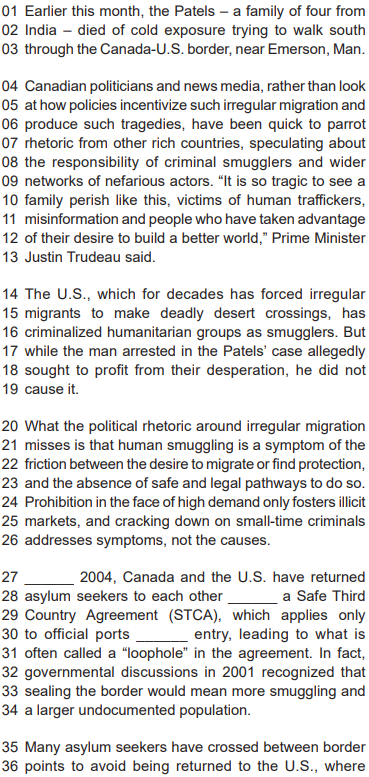Questões de Vestibular de Inglês - Comparativo e superlativo de adjetivos | Comparative and superlative
Foram encontradas 5 questões


( ) The last sentence in Text 1 (lines 44 to 46) presents two examples of adjectives in the comparative degree. ( ) “avoid being returned” (line 36) is about an action that will/would happen while “remember being arrested” is about an action that has already happened. ( ) The two instances of the word “such” (lines 05 and 06) have the same idea as “such” in “I cannot imagine anyone living on such a small salary”.
The alternative that presents the correct top-down sequence of answers to the sentences above is

Pseudoscientific claims that music helps plants grow have been made for decades, despite evidence that is shaky at best. Yet new research suggests some flora may be capable of sensing sounds, such as the gurgle of water through a pipe or the buzzing of insects.
In a recent study, Monica Gagliano, an evolutionary biologist at the University of Western Australia, and her colleagues placed pea seedlings in pots shaped like an upside-down Y. One arm of each pot was placed in either a tray of water or a coiled plastic tube through which water flowed; the other arm had dry soil. The roots grew toward the arm of the pipe with the fluid, regardless of whether it was easily accessible or hidden inside the tubing. “They just knew the water was there, even if the only thing to detect was the sound of it flowing inside the pipe,” Gagliano says. Yet when the seedlings were given a choice between the water tube and some moistened soil, their roots favored the latter. She hypothesizes that these plants use sound waves to detect water at a distance but follow moisture gradients to home in on their target when it is closer.
The research, reported earlier this year in Oecologia, is not the first to suggest flora can detect and interpret sounds. A 2014 study showed the rock cress Arabidopsis can distinguish between caterpillar chewing sounds and wind vibrations – the plant produced more chemical toxins after “hearing” a recording of feeding insects. “We tend to underestimate plants because their responses are usually less visible to us. But leaves turn out to be extremely sensitive vibration detectors,” says lead study author Heidi M. Appel, an environmental scientist now at the University of Toledo.
Question: Is there anything I can do to train my body to need less sleep?
Karen Weintraub
June 17, 2016

Many people think they can teach themselves to need less sleep, but they’re wrong, said Dr. Sigrid Veasey, a professor at the Center for Sleep and Circadian Neurobiology at the University of Pennsylvania’s Perelman School of Medicine. We might feel that we’re getting by fine on less sleep, but we’re deluding ourselves, Dr. Veasey said, largely because lack of sleep skews our self-awareness. “The more you deprive yourself of sleep over long periods of time, the less accurate you are of judging your own sleep perception,” she said.
Multiple studies have shown that people don’t functionally adapt to less sleep than their bodies need. There is a range of normal sleep times, with most healthy adults naturally needing seven to nine hours of sleep per night, according to the National Sleep Foundation. Those over 65 need about seven to eight hours, on average, while teenagers need eight to 10 hours, and school-age children nine to 11 hours. People’s performance continues to be poor while they are sleep deprived, Dr. Veasey said.
Health issues like pain, sleep apnea or autoimmune disease can increase people’s need for sleep, said Andrea Meredith, a neuroscientist at the University of Maryland School of Medicine. A misalignment of the clock that governs our sleep-wake cycle can also drive up the need for sleep, Dr. Meredith said. The brain’s clock can get misaligned by being stimulated at the wrong time of day, she said, such as from caffeine in the afternoon or evening, digital screen use too close to bedtime, or even exercise at a time of day when the body wants to be winding down.
(http://well.blogs.nytimes.com. Adaptado.)
1With the increasing popularity of wireless devices like smartphones — devices that can move lots of data very quickly — users have access to their social networks 24 hours a day. Most social networking sites have developed applications for your mobile phone, so logging on is always convenient. Social networks also tap into our human desire to stay connected with others. Besides, the rush of nostalgia as you connect with your former grade-school classmate on Facebook can be quite heady and exciting.
2But what's the main reason we find these sites so addictive? Plain old narcissism. We broadcast our personalities online whenever we publish a thought, photo, YouTube video or answer one of those “25 Things About Me" memes. We put that information out there so people will respond and connect to us. And being part of a social network is sort of like having your own entourage that follows you everywhere, commenting on and applauding everything you do. It's very seductive.
3In 2008, researchers at the University of Georgia studied the correlation between narcissism and Facebook users. Unsurprisingly, they found that the more “friends" and wall posts a user had, the more narcissistic he or she was. They noted that narcissistic people use Facebook in a selfpromoting way, rather than in a connective way. It may be an obvious theory, but it also suggests that social networks bring out the narcissist in all of us.
4Social networks are also a voyeuristic experience for many users. Following exchanges on Twitter or posts on Facebook and MySpace are akin to eavesdropping on someone else's conversation. It's entertaining and allows you to feel like a “fly on the wall" in someone else's life.
5Social networking sites also publicly list your “friends" or “followers" — giving you instant status. How many people do you know online who spend all their time trying to get more friends, more followers, more testimonials? We work hard in real life to elevate our statuses, make friends and search out boosters for our self-esteem. Online social networking provides this to us, and we don't even have to change out of our sweatshirts to get it.
(adapted from http://computer.howstuffworks.com/internet/socialnetworking/information/social-networking-sites-addictive2.htm)
Glossary
addictive: viciante; tap into: explorar/tirar proveito; broadcast: anunciar; entourage: comitiva/séquito; akin to eavesdropping: parecido com bisbilhotar; booster: aquilo que impulsiona; sweatshirts: camisetas